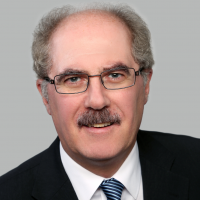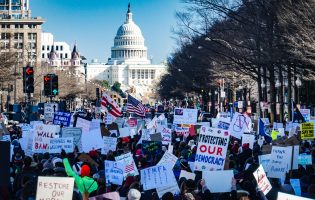
Совет Федерации via Flickr
Olaf Scholz Is No Neville Chamberlain

Klaus Larres
University of North Carolina in Chapel Hill
Klaus Larres is a DAAD/AICGS Research Fellow from February through April 2022. He is the Richard M Krasno Distinguished Professor of History and International Affairs at the University of North Carolina (UNC) at Chapel Hill. He served as a Counselor and Senior Policy Adviser at the German Embassy in Beijing, China. Larres is the former holder of the Henry A. Kissinger Chair in Foreign Policy and International Relations at the Library of Congress in Washington, DC, and a Member/Fellow of the Institute of Advanced Study (IAS) in Princeton, NJ. He also was the Clifford Hackett Visiting Professor of European History at Yale and a Fellow at the German Institute for International and Security Affairs (SWP) in Berlin, where he focused on German-Chinese relations. He was a Visiting Professor at Schwartzman College/Tsinghua University in Beijing, Tongji University in Shanghai, the Beijing Language and Culture University, as well as at Johns Hopkins University SAIS and the Woodrow Wilson Center in Washington, DC. He has held full-time professorial positions at Queen’s University Belfast and the University of London. He is also a non-residential Distinguished Visiting Professor at the Indian Institute of Technology (IIT) in Mumbai, India.
Larres has published widely on transatlantic relations, the Cold War, and U.S.-China-Europe relations in the 20th and 21st centuries. His latest books are entitled Uncertain Allies: Nixon, Kissinger and the Threat of a United Europe (Yale UP, 2022); Dictators and Autocrats: Securing Power Across Global Politics, ed. (Routledge, 2022); Terrorism and Transatlantic Relations: Threats and Challenges, co-ed. (Palgrave Macmillan, 2022); Understanding Global Politics: Actors and Themes in International Affairs, co-ed. (Routledge, 2020), German-American Relations in the 21st Century: A Fragile Friendship, ed. (Routledge, 2019); and many other books, including Churchill’s Cold War: The Politics of Personal Diplomacy (Yale UP, 2002), as well as many articles on U.S.-China-Germany/EU relations. He runs the Krasno Global Affairs & Business Council/Krasno Global Events Series at UNC and frequently contributes to the international media.
His DAAD/AICGS research project, “Breaking Up is Hard to Do: China as a Cause of German-American Tension in Transatlantic Relations,” will compare and analyze the different approaches the United States and Germany have taken in their relations with China since the early 2000s. The study explores why at times this has led to intense transatlantic disagreements and investigates whether or not different perceptions of the value of economic and political relations with China as well as historical experiences have been influential in both countries’ divergent views and strategies toward China. The study then explores how the fissure in German-American and transatlantic relations regarding China can be overcome.
Germany Will Not Appease Putin
Within weeks of succeeding Angela Merkel in early December 2021, new German Chancellor Olaf Scholz is confronting one of the most serious crises of the last few decades. War in eastern Europe has become a distinct possibility.
Russia, or so it seems, is on a determined path to war. How else could one interpret the 130,000 Russian troops amassed at the Russian-Ukrainian border, the simultaneous massive Russian maneuvers in Belarus, the naval maneuvers and other unusual activities in the Black Sea and Mediterranean, and the deployment of tanks, heavy weaponry and much else, often less than 30 miles from the Ukrainian border?
Chancellor Scholz’s cautious and careful maneuvering in such a dangerous situation has been much condemned in many quarters, not least in the United States, the UK, Germany itself, and Eastern Europe. Instead, it should be welcomed. Scholz is not about to do a deal with Putin when he meets him in the Kremlin on February 15, 2022.
The German chancellor is a strong supporter of maintaining western unity in the crisis. Scholz will not return waving a sheet of paper and declaring that he has achieved “peace for our time,” as Neville Chamberlain did on his return from his meeting with Hitler in Munich in September 1938. And, of course, whatever grim thoughts we may have about Putin, equating him with Hitler would be difficult to justify.
Scholz’s unexciting and low-profile, if not rather boring, approach is actually the right way to deal with the current crisis. Impulsive and emotional rhetoric of the kind sometimes used in London during the crisis by Prime Minister Johnson is counterproductive, though of course he may succeed in deflecting attention from his serious domestic problems by portraying himself as a Churchillian statesman.
The dramatic Cold War-style reporting of many U.S. media outlets, where war promises to greatly increase viewer numbers, is not very helpful either. Despite his best intentions, President Macron gave in to the temptation to exaggerate the results of his crisis diplomacy with Putin, only to be rebuffed by the Kremlin within a few days. Unwittingly, Macron thus contributed to the hyped-up atmosphere of our times.
And within Germany, the frequent media interventions of former Chancellor Gerhard Schroeder are also contributing to a polarized and heated atmosphere. The former Chancellor is a close friend of Putin’s, holds senior positions at Nordstream and Rosneft and has recently been nominated to join the supervisory board of the Russian energy giant Gazprom.
Still, Scholz’s undramatic approach to the crisis has been severely criticized, both within and outside Germany. In particular, his position on two important issues has been much attacked.
While Berlin is Ukraine’s largest financial benefactor, Germany has been condemned for not delivering weapons and also stopping Estonia from delivering German weapons to Ukraine. While this looks bad for outside observers, it is a long-standing convention in German politics not to deliver arms to conflict areas. Ignoring this would cause Scholz enormous domestic difficulties with his two coalition partners, including Foreign Minister Baerbock of the Green party, the parliamentary opposition, and not least the largely pacifistic German public.
Even more severely criticized has been Scholz’s refusal to be publicly drawn on the future of Nordstream II, that highly controversial gas pipeline running directly from Russia to Germany and currently awaiting approval by the German regulatory authority.
When Scholz visited Washington recently, President Biden promised to stop Nordstream II, if there were a full-scale invasion of Ukraine by Russia. Standing next to Biden, Scholz prevaricated and did not comment on the issue. Later over dinner, he is supposed to have told Senator Mitch McConnell and other senators that of course Germany would not let Nordstream II go online in the case of Russian aggression. In public, so far, he has never said this.
Clearly, it is unimaginable that Germany would happily receive gas deliveries via Nordstream II while Russia was fighting a major war in Ukraine. In order to prevent the outbreak of war, all kinds of other options are being discussed in Berlin, in cooperation with Kiev, the United States and the entire NATO alliance, including Ukrainian neutrality and some kind of binding guarantee that Kiev will never join NATO. After all, not a single NATO member is actually in favor of Ukraine’s accession.
Putin, however, has clearly taken note of the calm and sober voice coming out of the Chancellery in Berlin. He knows that Germany is Russia’s most important economic and geopolitical partner in Europe. He also knows that Scholz is not a pushover and will not be tempted to overdramatize and overpromise.
Scholz will also not allow himself to be divided from his allies in the European Union and across the Atlantic in the United States. He never tires of emphasizing the importance of the unity of the EU, NATO, and the entire transatlantic alliance. Though he has not gone into any detail, Scholz has nevertheless repeatedly said that Germany would also impose the most severe sanctions on Russia if Putin decided to move against Ukraine, an independent and sovereign country.
Scholz’s unexciting and low-profile approach is not appeasement. Perhaps instead it is Europe’s last best hope of persuading Putin not to embark on his mission to ‘make Russia great again,’ whatever the costs, and once again resort to war to achieve his political objectives.
In the end, of course, it is not Scholz but Vladimir Putin who will decide whether or not war will break out again in Europe. This by itself, that war and peace in 21st century Europe should be decided by the whim of just one man, is an aberration. Let’s hope Scholz can persuade Putin of the enormous costs this would have for Russia and indeed for everyone else.









